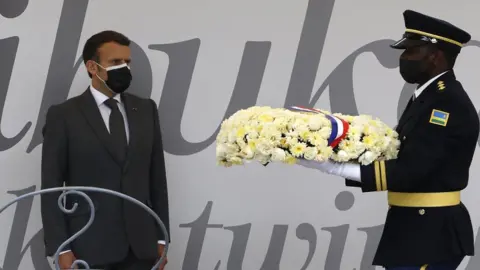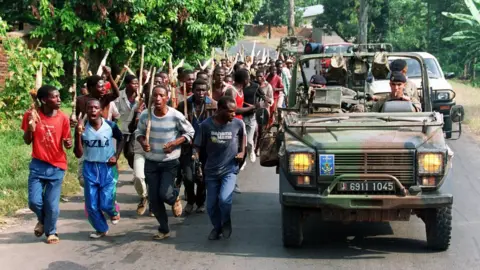Macron asks Rwanda to forgive France over 1994 genocide role
 AFP
AFPFrench President Emmanuel Macron has asked Rwandans to forgive France for its role in the 1994 Rwandan genocide in which about 800,000 ethnic Tutsis and moderate Hutus died.
Speaking at the genocide memorial in Rwanda's capital Kigali, he said France had not heeded warnings of impending carnage and had for too long "valued silence over examination of the truth".
But France had not been an accomplice in the killings, Mr Macron added.
Rwanda's leader praised his speech.
President Paul Kagame said, "His words were something more valuable than an apology. They were the truth." He called it "an act of tremendous courage".
In March, a French expert commission found that France under the late President François Mitterrand had borne "heavy and overwhelming responsibility" for the genocide but had not been complicit. The report said France had been "blind" to genocide preparations.
"Only those who went through that night can perhaps forgive, and in doing so give the gift of forgiveness," Mr Macron said at the memorial, where more than 250,000 victims are buried.
"I hereby humbly and with respect stand by your side today, I come to recognise the extent of our responsibilities."
A Hutu elite ruled Rwanda when the genocide took place, in April-June 1994, but they were later ousted by the Tutsi-led Rwandan Patriotic Front (RPF) under Paul Kagame.
 AFP
AFPMitterrand had close ties to former Rwandan President Juvénal Habyarimana, a Hutu.
"The killers who stalked the swamps, the hills, the churches, did not have the face of France. France was not an accomplice," Mr Macron said.
But he said that in 1994 "France did not understand that by wanting to block a regional conflict or a civil war, it stood de facto by a genocidal regime".

More on the Rwandan genocide:

The genocide was sparked by the downing on 6 April 1994 of a plane carrying Habyarimana and his Burundian counterpart Cyprien Ntaryamira, a fellow Hutu.
On 22 June the UN authorised the deployment of French forces in south-west Rwanda, in what was called Operation Turquoise.
That mission was controversial: the French humanitarian zone saved some potential victims from the genocidal killers, but later there were accusations that the French help had come too late and that some killers had managed to hide in the zone.
In 2015, then-President François Hollande announced that the Rwanda archives would be declassified but two years later, after a researcher sought permission to study them, France's Constitutional Council ruled that they should remain secret.
Mr Macron launched the new inquiry, allowing experts to study French official files from the time.
